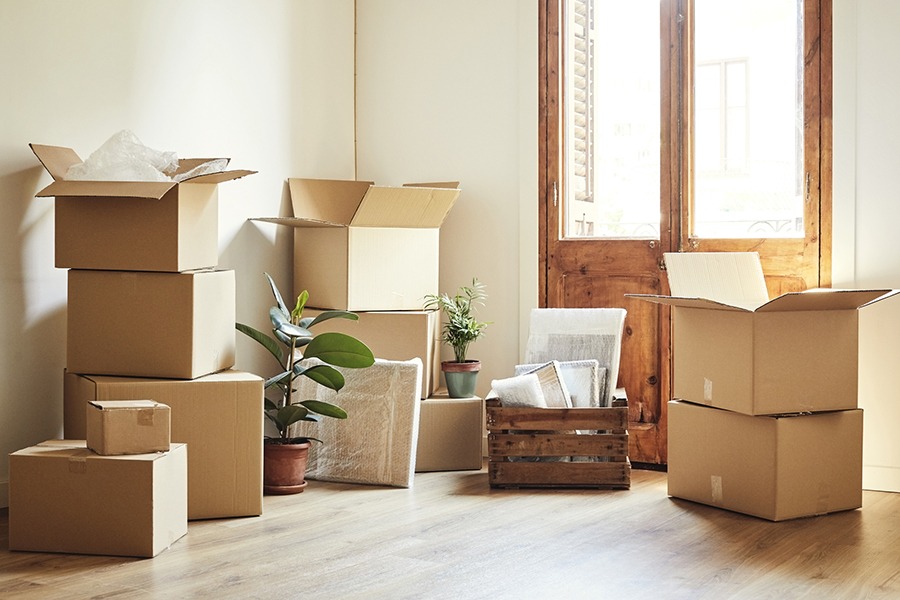Safety Tip #1: Sort, Clean, Sanitize, Repeat
Shifting during COVID-19 requires much more preparation, cleaning, and attention to detail, which could be a lot more exhausting than usual, so it’s important to start planning much beforehand.
It’s important to be ready with the list of items you want to move (i.e., leaving out the unwanted items), and make sure to effectively get rid of any last traces of virus on the surface of your goods by sanitizing everything.
To prepare your goods for the move:
- Sort through all household items and declutter unused/unwanted goods.
- Make a separate pile of goods which you can donate or sell (sanitize them too).
- Dust and wipe down goods like TV, AC, furniture, appliances, kitchen items, etc.
- Sanitize and disinfect all items which can’t be wiped using sanitizer sprays (mattress, sofa cushions, etc.)
Safety Tip #2: Pack 1 or 2 Essential Bags (At Least for 1 Week)
Considering the fact that your goods will be handled & touched by movers and traveled in a truck, it would be best to leave the delivered goods untouched for a few days. Moreover, unpacking immediately after arriving home is an impossible task, especially after a long hard day of moving.
So, until you get time to unpack your goods, you can have a much more comfortable stay, and you can keep up your daily routine if you have all the basic necessities close by and readily available.
You can also pack some important goods like documents and valuables in your overnight bag since they would be safer with you rather than the movers.
List of Overnight Bag Essentials:
- Sanitizers, gloves, masks;
- Clothes;
- Soaps & Toiletries;
- Medications;
- Kid’s Items;
- Pet Food & Toys;
- Clean Bedding;
- Basic Kitchen Items;
- Water & Snacks;
- Basic Cleaning Supplies;
- Laptop & other Electronics;
- Important Documents;
- Valuable Jewelry & Ornaments;
- Cosmetics;
Note: use a separate room to store your essentials bag and any other goods which you are planning to take with you in your vehicle, to avoid any confusion by the movers and to also ensure it does not get contaminated.
Safety Tip #3: Plan & Schedule the Right Date for Your Move
To ensure you stay away from crowded places and maintain a secure distance from people, it’s advisable to think well and hard about the day on which you want to move.
Experts suggest that the best days for moving are weekdays or the middle of the month (between 6th – 24th of every month) since not many people are out on the streets and moving companies would also charge nominal prices for a shifting job.
This is because weekends and month-end (calculated from 25th of a month – 5th of the following month) are the busiest times as most of the people prefer relocating due to time off from work or end/start of lease agreements; and owing to the soaring demand for shifting, packers and movers also charge twice as high.
Safety Tip #4: Update Your New Address in Important Places
The best way to make sure you don’t miss any important communications or online deliveries at your new house is by remembering to change your old address to the new one at necessary business places & firms.
Performing this step is particularly important if you’re moving out of state since it would be difficult to go back and get your address changed if there are no options to do it online.
Places to Update Your Address:
- Banks;
- Educational institutions;
- Credit card firms;
- Insurance firms;
- Post office;
- Online shopping sites;
- Food delivery sites;
- Magazine subscriptions;
Safety Tip #5: Remember to Manage Utilities for Both Homes
Forgetting to transfer, disconnect, or reconnect utilities could leave you extremely stressed out on the day you move in, or worse, have a heap of bills to pay for the services you didn’t even use!
Therefore, it’s absolutely necessary to contact the respective service providers before your move and tell them the exact date when you want your utilities to be cut off, transferred, or turned on at both your houses.
Utility Departments You Need to Contact:
- Electricity;
- Water;
- LPG Gas Agency;
- Telephone & Internet;
- TV Dish or Cable;
- Milk Vendors;
- Newspaper Agency;
- Garbage Collection;
Tip: Before moving out, note down the final meter readings of the electricity & water meters, so that in case you receive any unexpected bills after moving out – you would have a record of your last-used meter readings.
Safety Tip #6: Get All Repairs Done Before Moving In
Visit your new place a few weeks prior to moving and do a thorough walkthrough.
Check for the safety and working condition of all the electrical sockets, taps, plumbing, door hinges, any fans & lights already installed, etc.
Get them fixed or replaced before relocating to make sure you and your family have a secure start at the new home.
Safety Tip #7: Inform Movers if Anyone is Unwell in Your Family
Make sure to inform your movers immediately if any of your family members are unwell, or showing symptoms of flu, so that you can discuss the different options of rescheduling or work through the relocation.
If the movers decide to continue working with you even after getting the information of a suspected ill family member, they would at least be able to include additional protection for their moving labor and to safeguard you.




